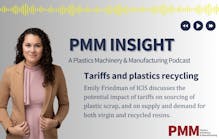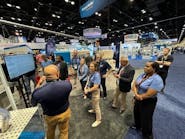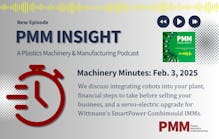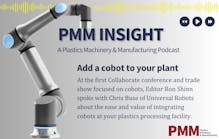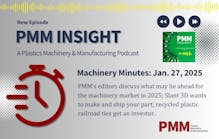Injection molding machine manufacturer Netstal builds machines that are precise and have a high degree of repeatability: “We do not take shortcuts and we do not do partial solutions,” said Nadeem Amin, president of North and South America for the Swiss company.
In terms of machine cost, the new Netstal top executive said processors need to look at the total value the machine is giving the company to make more money.
Hear the complete interview in this episode of PMM Insight with Editor Ron Shinn.
Transcript
Ron Shinn: Hello, welcome to PMM Insight, a Plastics Machinery & Manufacturing podcast. This is an episode of PMM in Person, where we talk to the most interesting players in the plastics industry. I am your host, Ron Shinn, editor of PMM.
My guest today is Nadeem Amin, president of North and South America for Netstal. He is based in Hebron, Kentucky. Thank you for joining us today, Nadeem.
Nadeem Amin: Thank you for having me, Ron. I do appreciate you taking the time to speak to me. I'm looking forward to our discussion.
Let's get right to it. You joined Netstal as president of North and South America in June. Can you tell us about your positions before Netstal?
Amin: Yes. I did start with Netstal in June of this year, in 2024, but I started my career in 1989 right out of school. I started at Husky Injection Molding Systems, which at the time it was known as, and I started my career in engineering, in preform design, designing molds, and helping customers look after molds through refurbishments and conversions. Got the opportunity to kind of grow in the company and move into various positions. My last position at Husky was Director of Global Business Growth, responsible for all of the products, working with the sales organizations globally to drive sales for the organization. And prior to that, I was Director of Business Development at Husky, developing new platforms for the industry, primarily in the PET market segment, and got the opportunity to work on some M&A projects. It was very exciting and I had tremendous opportunity to learn and grow in the industry. And in 2015 I started consulting on my own, which was fantastic. Got the opportunity to work with some great people. Learned a lot of new things. We worked on some complete turnkey projects for large brand owners, producing over a billion units per year, which my team worked on, and they did an amazing job. And long story short, in 2024 I got the opportunity to join the Netstal organization as the president of North and South America and it's been an exciting journey. I’m looking forward to the next few chapters.
Netstal is a well-known Swiss company that's been in business for 167 years and sold its first injection molding machine in 1945. KraussMaffei was the majority owner from 1992 until Netstal was acquired by the Krones Group in March of this year. What does it mean to your customers that you're now part of the Krones Group?
Amin: So Netstal today is part of the Krones organization. What it really means to the market is that Netstal is stronger than ever. We are now a very stable company. We have a tremendous amount of support from the Krones organization. And what this means for customers is we're focused on strengthening our global footprint for sales, service and spare parts to better support our customers through their needs. The other part of this Ron, which is very interesting, is this is very much a strategic fit for Krones, and that's all because Krones also owns MHT, which is a fantastic mold supplier in the PET market. They are located in Germany, they're a global organization that builds a fantastic PET molds, and we're very happy to be part of Krones and part of MHT to be able to create superior value for our customers. So that really means a tremendous amount of change in the industry in terms of what we can do for our customers, in our organization in the North American market.
Does Netstal and Krones, which is located in Wisconsin, operate as separate companies?
Amin: Yes, very much so. Netstal is still very much an independent company. We have complete autonomy in terms of decision making and what we do. But the great thing here is that we are able to reach out to Krones for support, and that relationship has been fantastic. I can tell you for myself, I've been able to reach out to the Krones organization for support in running Netstal Inc., here in the Americas, and that relationship has been really, really well received on both sides. I think we just finished up Pack Expo this week, and Netstal was part of the Krones team at the booth, but very much running as an independent organization. To give you an example, in the Americas I have a PNL. I'm responsible for the PNL at Netstal, and we do operate independently. We're able to make decisions very, very quickly, and that is really beneficial for us, for Netstal and our customers, so that we can respond very quickly to our customers’ needs. So, yeah, we are very much still an independent organization.
How do you assess the current market in North America for Netstal molding machines? How about looking ahead, say, for the next 12 months?
Amin: Yeah, so I'm going to say that's a very, very good question. If you asked me a month ago, I would have had a very different opinion. But I think now that the elections are over, customers can focus on finishing up 2024 and 2025. I think I am cautiously optimistic. People are still investing, but they're really putting a lot of thought into the investment. I think overall, from what I'm seeing, it will be a better year. I think 2025 and 2026 are going to continue to get better, but customers are cautiously optimistic.
What markets do Netstal focus on?
Amin: We have four market segments that we focus on. The first one is going to be PET, let's say PET closures, and that's really a strategic alliance with Krones and MHT. One the other markets, which is very important, is packaging. You know, we have a fantastic system for the packaging market, especially with our injection, compression molding capabilities on our machine that gives customers the ability to further lightweight applications. And we have a lot of new inquiries coming in on the packaging side of the market throughout South America. And the other one is really medical. Medical is a fantastic market for us. It's a market that we're looking at growing, and it's a market where we want to continue to promote the Netstal solution. And we have, just to give you an example, we have one customer now with approximately 70 machines going in every single year for the next three years globally. And the medical market is a fantastic opportunity for us, and it is a great opportunity for our customers, where we can bring in solutions to help them with the overall equipment. So we're very excited with not only PET enclosures, as I mentioned, that align well with Krones, but the packaging and medical markets are tremendous opportunities for us. Not only us, but also our customers in the U.S., providing solutions for them.
What does Swiss quality mean when it comes to injection molding machines?
Amin: So, what that means for our customers is basically quality, quality first, and that means precision and repeatability, which is also very, very critical for the medical market. We do not take shortcuts. We do not do partial solutions for customers. What I mean by that is that when our systems are designed and built, they're fully validated. So, it really comes down to Swiss means quality, precision and repeatability, being very, very precise, and that creates a value for our customers. Because let's face it, when a machine is not running or it's not producing quality products, our customers are not making money.
For some buyers, Swiss quality probably means a machine is going to cost more. So how do you answer that argument?
Amin: You know, this is a very interesting question that I get asked. And here's the thing. This is not like a car that you're going to buy, where it's really a need versus a want. Everybody wants a nice looking car, but this is really a need. When a customer is buying an injection molding solution, whether it's a complete work cell or a machine, you need a system you can rely on. When you talk about a machine that costs more, sure, yes, it costs more, but that generally also means, if it's done properly, like the Swiss quality, like the Netstal equipment, it's making you more money. And so you have to be careful when you look at just cost, you really have to look at what is the value that you know the equipment is going to bring to your organization for you to make money. And I'll give you an example. One of my customers that I visited mentioned to me that on the Netstal machine, it saves approximately $50,000 worth of energy year over year over year. So, if you look purely at cost, you might say, Yeah, you know, System A versus System B costs X amount more. But when you really look at what it's doing for you in terms of generating revenue, you have to look at the total cost of ownership. You have to look at the total part cost. So I would suggest to customers, don't get just caught up on the cost of the equipment, but really look at what's the value that it is bringing to your organization. That's really the important part.
Machinery manufacturers have done a good deal of price cutting during the past 18 months. Do you see that continuing much longer?
Amin: Well, it's really going to be up to the market. It's going to be up to the OEMs. It's going to be up to depending what happens in the industry. That's a hard one to answer. I think that's something we're just going to have to watch very closely and see where the market goes and the challenges that it brings to the industry. So that's going to be case by case, relative to OEMs, where they are, where they're located, and you know, in terms of how politics impacts their overall cost, and just generally, you know, the markets expectations and what they're willing to tolerate and change, right? So that's going to be, we're just going to watch that and see what happens over the next few years.
Would you please explain Netstal’s culture of innovation? What does it mean for your customers?
Amin: I think what it really means for us is, when we innovate, we have to really look at the voice of the market. You know, generally, you and I visit customers. One of the first things I ask is, what are your operational challenges? How do you see the market looking forward? What are your needs to become more operationally excellent? What it means to us is really listening to the market, listening to our customers, and then developing technology roadmaps around that to provide solutions. One of the things that we look at when we look at the market is innovation. We're very flexible on how we approach overall solutions. Now we have our recommendations, but we do offer customers solutions that are much more flexible relative to other OEMs. So let me give you an example. If we're going to be selling a system to a customer, we're not telling them you have to be locked and loaded and buy only the Netstal piece of equipment, meaning the mold. In some cases, our recommendation would be, is, yes; however, we would design our platform so that it is flexible to accommodate other OEMs molds and give our customer the maximum value that they can extract from a system. So the culture of innovation for us is really understanding the market, listening to our customers, and not locking them down or penalizing them because they may pick or choose other OEM components to bring a complete system-level solution together. So that's very important. The other part of the innovation is
really looking at what's happening in the market. For example, one of the struggles that our customers is facing, and every customer I visit is telling me this, that it's becoming more and more difficult to hire people that are willing to work. So that's where the voice of the market and the voice of the customer comes back in. We look at what can we do to help the market through innovation, whether it's automation or making our systems very, simple to use, and that's what we've done in in many of our cases where the customer is telling us that we need systems that are easier to run, like that are efficient. We've made, for example, our HMI, very simple to use, a green button for start and a red button for stop. It's really listening to the market and designing equipment that satisfies what the market needs, what our customers need.
Could you briefly describe the types and ranges of Netstal injection molding machines?
Amin: In the PET market right now, we offer a 300-ton to 500-ton, anywhere from 24 cavities to 260 cavities. And these systems in the PET market have the highest output, not only the highest output, but quality -- quality that meets the market’s needs and also achieves the fastest cycle times in the industry. The lock to lock on a system like that is approximately 1.9 seconds. So it's leading the industry in terms of performance. Once again, the HMI is fantastic. It's very simple to use. Our customers are telling us this, in the closure market, we have our cap line up to 4500 and if you were at NPE, you would have seen that system running a 128 cavity mold, which is a fantastic output for 4000 to 4500 machine. And we were running sub 1.9 seconds, approximately, with our mold partner, and they did a fantastic job in helping us bring that system together. We have the PET market, the cap market systems, and in the other one which is really important is the packaging. We have the Elion and the Elios machines, which have been really well received. So we have a fantastic solution for the packaging market, and likewise with the medical market. And on the medical market, our systems are able to operate in a clean room of ISO seven, eight and nine. We offer our Elion machine, which comes in all-electric and a hybrid system, and that goes from anywhere from 120 tons, which is sort of the most popular for the medical market, up to 500 tons in some applications, for example, like in blood vials. And this is a great market segment for us. We're picking up a lot of momentum in this part of the industry. We're able to demonstrate to the industry that we have a fantastic solution here. And as I mentioned earlier, we have multiple systems going in to customers over the next three years. And the great thing that I'm learning in talking to customers is that we have some great feedback, but we're getting repeat orders from the same customers. And you know, on the PET side, we had a customer purchase two machines, and now they're purchasing another seven or eight, approximately, to go globally. In the medical market, we have a customer that has approximately 70 machines going in every year for the next three years globally. So that really has been well received, and we've got a fantastic solution in the PET cap, packaging and medical markets.
Which machines are the best sellers in North America?
Amin: Great question. There is no cookie cutter answer for a machine that we sell. So we look at each customer on each application in a unique way, in terms of what the customer is asking us for, and at the same time, we take sort of a solution based approach, and we'll provide recommendations to a customer. Many times customers haven't even thought about what we bring to the table, and that sometimes changes the answer. But our intention really is a solution-based approach to the customer, and there really isn't a cookie cutter answer coming back to your question. And so that machine size, or that you know, the tonnage size, or the overall solution varies from customer to customer.
Do you warehouse any molding machines in the U.S. for faster delivery? And the same question about spare parts?
Amin: Let me start with spare parts, because spare parts is a critical service, and spare parts are absolutely critical for our customers. We've got a fantastic team, not only in the United States, but also in Mexico and Brazil. And we do inventory spare parts. We have a technical center here in the United States, in Hebron, Kentucky, right beside the Cincinnati airport. We inventory our spare parts there. The majority of the spare parts that our customers call for we have in inventory, and if not, we get them from Switzerland, or we may bring them in from Mexico or Brazil. So our response time is very quick. However, here's the thing. What I will say is our response time and our ability to service our customers is going to get much better now that we have the support, the global footprint and support from Krones. Absolutely one of our mandates is to improve our sales, service and spare parts globally through utilizing the Krones network. In regards to inventory machines, we do inventory some machines, and we have been able to respond very quickly to the market for those needs. We've had an Elios 5500. We have an Elion 7500 which we actually sold. That was done, and that one was very unique, because a customer needed it very, very quickly, and we already had that in the United States, and were able to get that out to them and installed and up and running. And because of these things, our customers are able to win over business, because they can respond faster to the market. We also have an Elion 3200 and Elios 4500 cap line. So we do keep some equipment in our inventory here in the United States. We cannot keep everything here, but it is something that we are looking at closely. We will review this again for 2025 to see what we should keep here in the United States to better serve our customers.
You talked a little about spare parts. Can you tell us a little bit more Netstal’s customer service? How do you handle that in North America?
Amin: We have an entire service team here that supports our customers. And we have a fantastic team, very, very committed team that travels over the weekends, you know, that can visit customers, especially in a machine down situation. That's sort of our number one priority when a machine goes down. We have a team that can jump on this and get in front of a customer to get it back up and running, because, let's face it, if a machine is not running, our customers are not making money. So that's sort of our priority. We've got a very dedicated, strong team here to support customers. The other side of it, what I'll say, is looking at life cycle programs. So this is very unique for our customers. As I mentioned, it's difficult to find people that are willing to work. So we are engaging much more with our customers, where we come in and do the critical maintenance and allow our customers to do the day-to-day or basic maintenance. So that's a that's a program that we're very much focusing on with our support from Krones in order to grow that business. That's helpful for our customers, because it gives them peace of mind. And we're also able to remotely connect with machines. So if it's something that we can resolve very, very simply over the phone or connect with the machine, that would be the first approach right in terms of service and in the long term, support, where we're coming on site, is really to keep the machines up and running and running efficiently. And when we come on site, we're not just coming on site to do an audit like other OEMs. We're actually coming on site with parts in hand to do the work to ensure that the machines are leveled and operating efficiently for our customers. So that's where we're a little bit different. We're much more engaged, much more involved in the level of work we would do. And we allow our customers to decide how much they want that to be, whether they simply don't have the resources or simply don't have the expertise. And you know, in the medical market, for example, we're working on a program right now where we're going to be going in at least once a quarter, if not more frequently, to make sure that those machines are running efficiently.
Nadeem, thank you for bringing us up to date on Netstal. This has been a great discussion.
Amin: Thank you. I appreciate you giving me the opportunity to speak. And what I would say, Ron is, customers that are listening out listening out there, I would say, “Hey, pick up the phone. Give us the opportunity. Give us the opportunity to show you how we can support you, how we can support you with your system needs, your operational excellence.” Netstal is not the company it was years ago. We are much stronger than ever. We have the global footprint through Krones to be able to make change, and we're going to continue to make change in better supporting our customers through better innovation and better response time. If you have a need, you need a solution, or you just want to get another opinion, please pick up the phone. Give us a call. We're more than happy to engage with you, to give you our perspective of how we can support you.
My guest today has been Nadeem Amin, Netstal's president for North and South America.
Amin: Thank you, Ron.
I hope you have enjoyed this episode of PMM in Person. Thanks to associate editor Marvin Brown for editing this podcast. You can always find our podcast and the latest information about the worldwide plastics industry on our website, www.plasticsmachinerymanufacturing.com, and on social media. Remember to subscribe to this podcast on your favorite podcasting app, and please tell a friend or colleague who would enjoy the show. This podcast is produced by Plastics Machinery & Manufacturing, an Endeavor Business Media brand.
Ron Shinn | Editor
Editor Ron Shinn is a co-founder of Plastics Machinery & Manufacturing and has been covering the plastics industry for more than 35 years. He leads the editorial team, directs coverage and sets the editorial calendar. He also writes features, including the Talking Points column and On the Factory Floor, and covers recycling and sustainability for PMM and Plastics Recycling.

